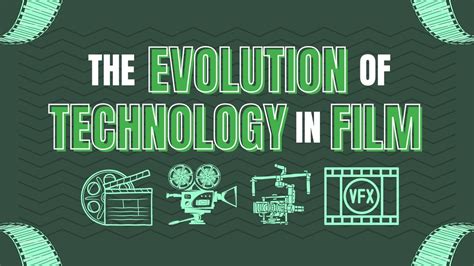The film industry has undergone significant transformations over the years, driven by advancements in technology. From the early days of cinema to the present, film tech has played a crucial role in shaping the industry into what it is today. In this article, we'll explore the evolution of film tech and its impact on cinema systems.
The Early Days of Cinema

The first film cameras were developed in the late 19th century, with the first public screening of a motion picture taking place in 1895. The early days of cinema were marked by the use of simple cameras, projectors, and film stock. The first films were short, silent, and black-and-white, with the first feature-length film, "The Birth of a Nation," released in 1915.
The Advent of Sound

The introduction of sound in films marked a significant milestone in the evolution of film tech. The first "talkie," "The Jazz Singer," was released in 1927, and it revolutionized the industry. Sound enabled filmmakers to create more immersive experiences, with dialogue, music, and sound effects enhancing the cinematic experience.
Color Film

The introduction of color film in the 1930s further enhanced the cinematic experience. Color film stock, such as Technicolor, enabled filmmakers to create vibrant, colorful images that added depth and emotion to their films.
The Advent of Widescreen Formats

The 1950s saw the introduction of widescreen formats, such as CinemaScope and Cinerama. These formats enabled filmmakers to create more immersive experiences, with wider screens and more detailed images.
The Advent of Digital Technology

The advent of digital technology in the 1990s marked a significant turning point in the evolution of film tech. Digital cameras, editing software, and visual effects tools enabled filmmakers to create complex, detailed images with greater ease and flexibility.
Modern Cinema Systems

Today, cinema systems are more advanced than ever, with the use of digital projection, 3D technology, and immersive audio systems. Modern cinemas offer a range of formats, including IMAX, Dolby Cinema, and 4DX, which provide audiences with a range of immersive experiences.
Advantages of Modern Cinema Systems
Modern cinema systems offer a range of advantages, including:
- Improved image quality, with higher resolution and greater detail
- Enhanced sound quality, with immersive audio systems
- Increased flexibility, with the ability to show a range of formats and content
- Greater accessibility, with the use of digital technology and online ticketing systems
Future of Film Tech

The future of film tech is exciting, with a range of emerging technologies set to transform the industry. These include:
- Virtual reality (VR) and augmented reality (AR) technology, which enable immersive, interactive experiences
- Artificial intelligence (AI) and machine learning (ML) technology, which enable the creation of complex, personalized content
- 5G technology, which enables faster, more reliable data transfer and streaming
Challenges and Opportunities
The future of film tech also presents a range of challenges and opportunities, including:
- The need for greater investment in infrastructure and technology
- The need for greater collaboration between filmmakers, technologists, and industry stakeholders
- The opportunity to create new, innovative content and experiences
- The opportunity to reach new audiences and markets
Conclusion
The evolution of film tech has transformed the industry into what it is today. From the early days of cinema to the present, film tech has played a crucial role in shaping the industry. As technology continues to advance, the future of film tech is exciting, with a range of emerging technologies set to transform the industry.
We'd love to hear your thoughts on the evolution of film tech! Share your comments and opinions below, and join the conversation on social media using the hashtag #FilmTech.





What is the history of film tech?
+The history of film tech dates back to the late 19th century, with the first film cameras and projectors developed in the 1890s. The industry has since evolved, with the introduction of sound, color film, widescreen formats, and digital technology.
What are the advantages of modern cinema systems?
+Modern cinema systems offer improved image quality, enhanced sound quality, increased flexibility, and greater accessibility.
What is the future of film tech?
+The future of film tech is exciting, with emerging technologies such as virtual reality, augmented reality, artificial intelligence, and machine learning set to transform the industry.
